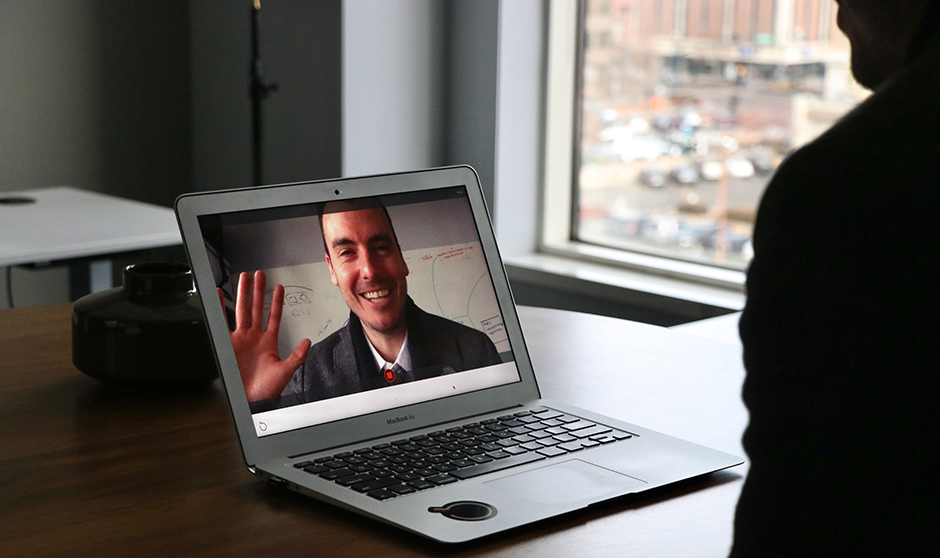Sales prospecting is tough. With inboxes overflowing and buyers getting bombarded by messages, standing out is harder than ever.
That’s where video prospecting comes in.
Instead of sending another text-only message, a video message grabs attention, builds trust and sets you apart.
In this post, we’ll break down why video prospecting works and how to use it in your sales process.
Why Video Prospecting Works
Video prospecting is the process of using personalized and automated video messages to reach potential customers. It gives sales reps a more engaging way to build relationships with prospects.
Most salespeople today still prospect over email, direct messages and phone calls. But cutting through the noise is difficult with these approaches. Adding video messages into sales outreach immediately elevates you above the competition.
Here are a few reasons why.
Video Captures Attention
Think about your own inboxes. A wall of text is easy to ignore, but a video thumbnail with a smiling face? That stands out.
Video naturally draws the eye, increasing the chances that your prospect will stop, click and listen. According to our data, emails with videos get 120% higher response rates and 2x clicks.
Video Builds Trust Faster
We do business with people we like and trust. A video gives prospects a chance to see your face, hear your voice and connect with your personality.
This builds trust faster than a standard email or message. Instead of sounding like another sales pitch, you come across as a real person who genuinely wants to help.
(btw, this is why video is also a great tool when asking for referrals. Read more here on this topic.)
Video Separates You From Everyone Else
Most sales reps send the same cold emails or messages:
“Hey [First Name], I wanted to reach out because…”
Sound familiar?
A personalized video disrupts this pattern. When everyone else is using text, you can show up with a warm, engaging message that feels human.
Video Enables Clearer Communication
Some products or services are harder to explain, especially over a written message. Videos, on the other hand, make it much easier to clarify confusing details, anticipate questions and add helpful context.
Many video messaging platforms like BombBomb also come with screen recording capabilities. With a screen recorder, you can walk through a demo and show your solution in action. This helps prospects connect the dots and visualize the transformation that comes after purchasing your solution.
And guess what? You don’t need fancy equipment for this to be true in your sales process. Filming with webcam or smartphone is enough to humanize your outreach and establish genuine connections with buyers.
Video Produces Results
Video prospecting isn’t just attractive in theory. It works.
In a case study we conducted with an enterprise sales team, sellers saw a 56% increase in replies to cold emails with video.
Another sales team was hoping to achieve a 25% response rate and build a pipeline of $250,000 within their first 30 days of using video. They exceeded that goal by a wide margin – they hit a 70% response rate and $1.2 million pipeline in one month.
Check out Amplexor’s story below…
Brad Stoehr of Horizon Investments was also able to make $313 million for his company in 18 months because of video…
It doesn’t take long to prove the value of video prospecting. Sales professionals who use video messaging see an immediate impact to response rates and engagement.
When Should You Use a Video for Prospecting?
Video is especially useful for outbound sales, inbound lead response and setting appointments.
Video increases outbound response rates because prospects are less likely to ignore a message from a real person. They see that someone is trying to connect and offer a valuable solution to a problem they’re experiencing right now.
Here’s an example of a financial advisor using a video message to re-engage a lead…
Video also enables sellers to make a great first impression with an inbound lead.
Right after someone submits their information, you can send a video introducing yourself and thanking them for taking their time. This establishes trust early and makes people more comfortable about taking the next steps in the sales process.
One great way to continue nurturing inbound leads is to offer ongoing education. If you keep offering value, some percentage of your leads will convert into qualified prospects and then ultimately into customers.
Here’s an example of a wealth management professional sharing information about the upcoming tax season for both prospects and existing clients…
Furthermore, video overcomes one of the biggest challenges in sales – getting people to commit to and show up for appointments or demos.
A video message is a great way to remind prospects why taking a meeting would be valuable to them (not to you). Videos also make it harder for people to cancel or skip meetings. They realize that they’d be disrespecting or disappointing a real person.
After a meeting, a video messaging is an effective way to summarize what you discussed and recap next steps. A simple follow-up video message keeps deals moving forward.
Here’s an example…
Note: A video message is NOT a good fit in situations when you just need to give someone a simple response or answer. In that case, do what’s convenient for your prospect. Send a quick message or email and save video for bigger moments in your prospect’s buying journey.
Video Prospecting on LinkedIn
Knowing how to use video for prospecting on LinkedIn can be a game-changer for your business. That’s why this topic deserves its own section.
Here are different ways you can use video to your advantage on LinkedIn.
Direct Messages to Existing Connections
Cold prospecting on LinkedIn is all about making an impression, not making a sale. It’s about engaging with individuals in a memorable way so that you can continue to build relationships over time.
One of the best places to use video is in direct messages.
The key is to make your videos personal and valuable. Check out this example…
Todd immediately offers value by asking his recipient how he can help. He’s selling, but he’s listening and providing service first.
Response to connection
Sending a personal video message to a new connection is a powerful way to start a relationship. Keep your message short, and share one or two reasons why you’re excited you found each other on the platform.
Here’s an example of a seller using an evergreen (pre-recorded) video in response to new connections…
By sending a video, this person disrupts what recipients expect. He’s easily remembered, which is a great foundation for future sales conversations.
Note that he does try and get recipients to take a next step with him. This can work depending on your target customer and the services you offer.
However, sometimes it’s best to not pitch people immediately after connecting with them. You can focus on building a relationship first before asking for that initial sales conversation.
Celebrate milestones
Promotions and work anniversaries are perfect opportunities to reach out with a video. Congratulate the prospect and don’t make any sort of offer or sales pitch. Simply celebrate with them.
If you know the recipient, make a personal video message. If not, send an evergreen video like this example…
Video Prospecting on Facebook
The video messaging use cases that are valuable on LinkedIn are also well-suited for Facebook.
You can introduce yourself to new connections and congratulate people on exciting milestones. You can also follow up with them after events or share resources that you think would be valuable.
As you become more comfortable with video messaging, you’ll come up with new ideas and ways to engage with prospects on the platform that fit your sales cycle.
9 Best Practices for Video Prospecting
To make the most of your video prospecting efforts, follow the six best practices outlined below.
1. Use Strong Email Subject Lines
Prospects need to open your emails before they can watch your videos. To improve your open rates, use subject lines that:
- Indicate that you’ve sent a video
- Invoke curiosity
- Mimic internal communications
Adding “video” in a subject line like this “ Quick message for you…” is an easy way to get more people to read your emails. We’ve proven this time and time again at BombBomb.
“An opportunity you don’t want to miss…” is an example of a subject line that creates a curiosity gap. It suggests there’s a difference between what your prospect knows and what they don’t know. People will open an email to close this gap and satisfy their curiosity.
“New solution” is a simple subject line that looks like something one colleague would send to another. This is often better than something like “Introduction: Inventory Management Solution for <Company Name>.” The more “salesy” your subject line, the less likely you’ll get an open.
(and here’s a longer article on different sales email templates you can use for various situations)
2. Provide text-based context
Whether you’re sending an email or direct message, always include some text-based context with your video message. Sending a video alone can come across as spammy, especially when reaching out to cold leads.
Provide a quick description of what your video is about without providing too many details. You still want to peak curiosity and leave enough unknown so that your prospect has to play the video for full context.
3. Employ the EVA Framework
If you want to create videos that elicit replies, follow the EVA Framework: Empathy, Value, and Action.
- Empathy: Get to know your prospects. Understand their pain points. Empathize with what they’re going through, so you can work with them on a solution.
- Value: Provide value in your sales prospecting videos. Ask your prospects how you can help them. Then, you can deliver solutions to the challenges they are facing.
- Action: Include a clear call-to-action in your video. What action do you want them to take? Tell them that, and reiterate it a couple of times, so they are more inclined to do it.
4. Keep Your Videos Short
Try to keep your video messages under 60 seconds. Prospects are busy, so get to the point quickly. You can go longer once you’ve established rapport with your prospect.
Here’s a simple framework you can use:
1. Introduce yourself (smile and say their name)
2. Mention why you’re reaching out
3. Highlight a key benefit or insight
4. End with a clear call to action (book a call, reply, etc.)
Example script:
“Hey Sarah, I saw your post about [topic] and wanted to reach out. I work with sales teams who struggle with [pain point], and I think I can help. I made this quick video to share an idea—let me know what you think!”
5. Embrace Imperfections
Keep things simple. Don’t worry about filming elaborate videos with scripts and green screens. If you make a mistake, keep going.
This is what keeps your video messages real and makes you relatable. It can help to not rewatch your videos. Lean into authenticity, and don’t let your insecurities or unfair self-criticisms get in the way.
6. Get Attention with an Animated Preview (GIF) or Video Thumbnail
Many video email platforms will display your video as a thumbnail or animated preview (GIF) within your email. Use this to your advantage.
Make the first few seconds of your video visually exciting. Wave at the camera or hold up a whiteboard with your prospect’s name. Have fun with it and get creative.
Here’s one example…

Check out what this looks like when someone goes all out…

7. Know When to Send Personal vs Pre-recorded Videos
Whenever possible, record and send personal one-to-one videos.
If that’s not scalable or if you want to leverage automation, create personal videos for your top 20 prospects only and then pre-record evergreen videos for everyone else. These are videos that work for any recipient because you don’t reference a specific person or situation.
Evergreen videos are still more effective than plain text, and they’re efficient if you need to recapture some time in your day.
8. Use Screen Recorders
As mentioned above, screen recorders can help add clarity and help recipients visualize what you’re saying. They can also be effective for outreach if you’re willing to get creative.
For example, you could pull up your prospect’s LinkedIn profile and record yourself commenting on a shared interest or professional experience.
Though this may seem like a strange tactic, most people don’t feel this is an invasion of privacy – they’re profile is public after all!
Here’s an example…
9. Use Video Analytics to Guide Your Follow-up Efforts
If your video prospecting tool has tracking and analytics capabilities, use that data to focus on hot opportunities that have a higher chance of closing. Someone who watched 80% of a video is worth pursuing over someone who didn’t watch your video at all.
A great strategy is to set up notifications so that you know as soon as someone opened an email or watched a video. Give that person a call or send another video immediately to strike while the iron is hot.
10. [Bonus] Combine Cold Calling with Video Prospecting
If cold calling is part of your sales process, video prospecting is still valuable. With the right combination of approaches, you can dramatically increase your chances of making a connection with a cold lead.
(read more on cold-calling here, and if you need better discovery questions, check out this post.)
Take Your Sales Prospecting to the Next Level
Sales prospecting burns people out. That’s why it’s important to invest in techniques and technologies that generate better results for less effort.
Incorporating video messages into your sales process checks both boxes. You can send fewer emails and make fewer cold calls when you use video messaging because it converts at a much better rate.
Yes, it takes time to get comfortable with video. It’s a new skill and habit you need to build. But once you do, your sales process (and results) will never be the same.
If you want to give video messaging a try, sign up for a free 14-day trial here.
You can also schedule a demo here to see additional BombBomb features and learn how other sales teams are using the platform.






